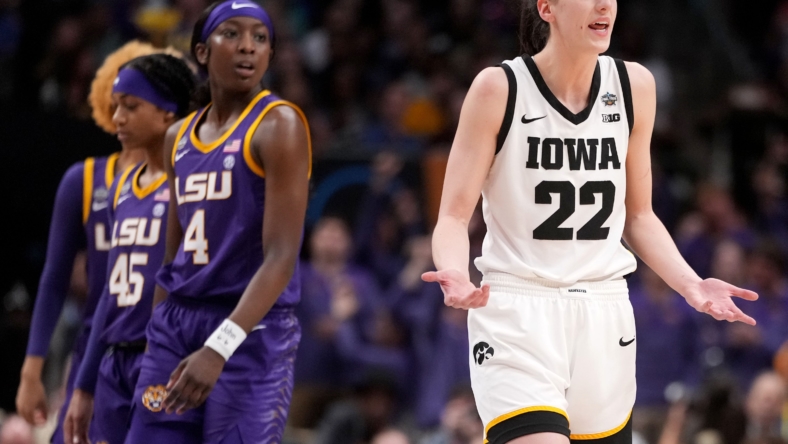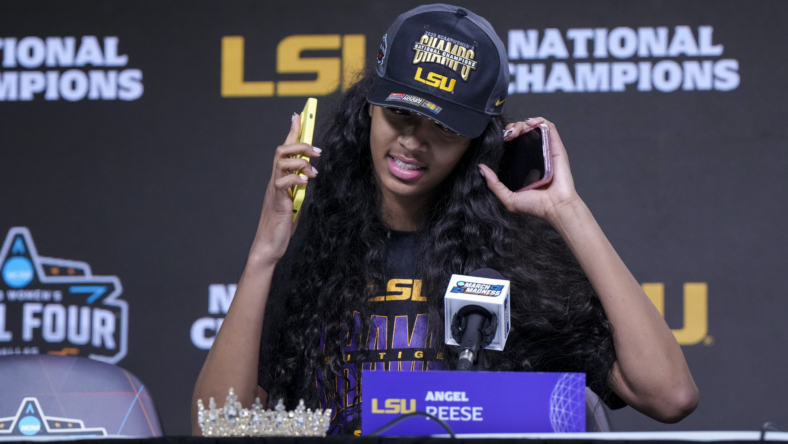
Well, you have to hand it to women’s basketball, it has arrived at the college level. That development was on full display during the NCAA Tournament Women’s Final Four.
The weekend had it all. Star power was represented by Caitlin Clark, who did her best Pete Maravich while nearly carrying Iowa to a national title. Clark had 41 points in a semifinal win over South Carolina, including her team’s last 13 points.
March Madness drama unfolded in the upset of undefeated South Carolina, which was considered a lock for a second consecutive championship. In kind, you had unprecedented viewership, with ESPN revealing the ’23 Women’s Final Four was its most viewed edition to date, according to data from Nielsen’s fast nationals.
But the real indication women’s basketball has arrived is that none of those things dominated the talk-show circuit on Monday. Rather, the jabber focused on trash-talking, racism and double standards. And the highlights on your TV and telephone screens started with slow-motion replays of provocative taunts and insults.
Welcome to the new world of women’s basketball.
As you know, taunting, “trash-talking” and Monday-morning reaction has been part of men’s sports for some time. You have your finger-waves, your crowd-shushing, your flexing, your standing over fallen adversaries and your inside-joke gestures to the bench. Of course, let’s not forget the fundamentals – the fist-pumps, chest-pounds, finger-points and jaw-flaps.
That probably doesn’t cover all of it, but you get the gist. But to this discussion, the women’s game didn’t. The genre has moved more slowly into this ostentatious neighborhood. After all, there’s just more than a handful of women who can get higher than the rim, even on the professional level. Windmill dunks, helicopter landings and screaming acknowledgements are not standard fare.
Rebounds aren’t snatched with the same authority, blocks aren’t made as prejudicial and fadeaway jumpers are rare. That said, strength, training and athletic skill progressively marches on, across all genders, all sports. Women’s basketball is no different.
Fact is, some praise the women’s game as being more pure, more relatable and more enjoyable to watch. The game resembles the one with which they grew up, reliant on movement, positioning and ball-sharing. Yes, players like Clark can create their own shot. But the game plan isn’t based on it, a team concept still prevails.
Moreover, women’s basketball historically has been more gentlemanly – forgive the cross-reference – more civil and more dignified … until now.
Related: Women’s NCAA Championship, LSU withstands Iowa’s comeback bid to win title
Women’s basketball has arrived in sports landscape

Over the weekend, the kinder, gentler version was covered over with in-your-face wallpaper, characterized by ring-finger tapping, John Cena’s “You Can’t See Me” hand-waves. And, perhaps most significantly, it was done so in the name of “disrespect.”
The last has become a mandatory declaration in big-time sports. If you listen to today’s athletes, the element of respect represents the cornerstone of all athletic endeavors – both on a personal and collective basis. That is, all behavior, physical or vocal, within the framework of competition or outside of it, is to be construed as an act of respect or lack thereof.
Granted, in many cases, it’s not entirely clear what type of esteem is in question, how it has been earned or whether the demanding party has a legitimate call to require it. But even raising that examination might be showing someone, somewhere disrespect. Furthermore, to demonstrate disrespect is to invite a disrespectful retaliation of the offended part’s choosing. In short, you’re foaming the runway of disrespect. And if you don’t see that, you might just be a racist.
How did we get here?
On Sunday, as her team closed out a first national championship championship, LSU’s Angel Reese celebrated the achievement by taunting the defeated Clark. Reese did the hand-wave, the finger-tapping, etc. and followed Clark around the court to make sure she saw it. Reese took attention away from the moment to put her controversial stamp on it, then justified it by playing the perfect trump card – “disrespect.”

“She disrespected Alexis (Morris) and my girls, South Carolina, they’re my SEC girls too,” Reese said. “Y’all not going to disrespect them either.”
The reference was to Clark’s antics during Iowa’s upset of South Carolina. Clark also used the Cena gesture and, at one point, dismissed the idea of defending against guard Raven Johnson with a dismissive wave of the hand.
At least in Reese’s mind, the disrespect shown Johnson automatically transferred to Morris, her LSU teammates and the entire SEC. This reporter has inquired if wearing masks can prevent such a transmission from occurring, but the CDC has yet to collect sufficient data.
Reese seemed more on point when she suggested her taunting behavior was drawing more outrage and condemnation than that of Clark. She suggested a racial double standard was in play. She’s black, Clark is white. Earlier this season, Reese tweeted something that might help explain her perspective.
“I’m too hood. I’m too ghetto,” she tweeted. “I don’t fit the narrative and I’m OK with that. I’m from Baltimore where you hoop outside and talk trash. If it was a boy y’all wouldn’t be saying nun at all. Let’s normalize women showing passion for the game instead of it being ‘embarrassing.’”
Meanwhile, many of the podcasts and sports talk shows are running with the translation. Seems debatable, if not focused in the wrong place.
Did Reese’s actions get more attention? No doubt. Her gestures were considerably more demonstrative and took place under a championship-game spotlight. Is it entirely surprising the behavior is commanding more attention? Hmmm.
Her perception that she – a black girl from a city environment – doesn’t fit the basketball narrative seems a stretch. Whether this contradiction is a racial issue certainly bears consideration, and today’s divisive environment welcomes it. Many justify and rationalize Reese’ actions with words like “passion,” “motivation” and “entertainment.”
Clearly, players of the past, who did not indulge in the attention-grabbing and mocking lacked passion, motivation and entertaining value. Shame on you Bill Russell, Oscar Robertson and “Pistol Pete.”
Satire aside, people seem to miss the sentiment put forth by Benjamin Rush in 1783. That is, as the signer of the U.S. Declaration of Independence cited, “two wrongs don’t make a fight.” Or in this case, all due respect, two classless actions don’t make a class act.
Were Clark’s gestures interpreted differently because she is a white girl from Des Moines – at least in some cases, that seems reasonable. Was Reese taken to task because she’s a black girl from Baltimore – hope not, but again, realistically you might assume so. The point is, one is not justifiable by the other.
Both of the actions are worthy of disdain, absolutely. Is there a reason to compare and contrast the incidents, pro-rate them? No. The term “unacceptable” doesn’t include different interpretations or addendums.
In the end, the game, the competition, the pageantry was … wait for it … disrespected. In the end, it puts women’s basketball right in step with what takes place in men’s sports regularly, moves the “normalize” needle.
Taunts beget taunts, gestures invite gestures and the boorish behavior that took place in Dallas will become commonplace.
No disrespect intended.